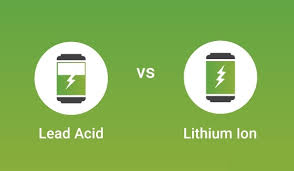
The lead-acid battery has been around for over 100 years that costs less, requires regular maintenance to keep them working properly and doesn’t last as long.
Lithium-ion battery relatively newer technology with a longer lifespan, high power density, higher efficiency, does not require regular maintenance but costs more.
Both technologies are affected by discharge cycles, Lithium-ion has a significantly higher cycle life than lead-acid in deep discharge applications such as in solar. This disparity is further increased as ambient temperatures increase.
The cycle life of both chemistries can be increased by limiting the depth of discharge (DoD), discharge rate, and temperature, but lead-acid is generally much more sensitive to each of these factors.
In hot climates where the average temperature is 33°C, the disparity between lithium-ion and lead-acid is further increased. The cycle life for lead-acid (flooded and VRLA) drops to 50% of its moderate climate rating while lithium-ion will remain stable until temperatures routinely exceed 49°C.
Another critical consideration for lead-acid is how long the system will take to discharge. The shorter the discharge period, the less capacity is available from the lead-acid battery. A 200Ah lead-acid battery will only deliver 120Ah if discharged over a one hour period. In contrast, a 200Ah lithium-ion battery system will achieve over 184Ah. This condition makes lithium-ion very well suited for applications where full discharge occurs in less than eight hours.
| Flooded lead-acid | VRLA lead-acid | Lithium-ion (LiNCM) | |
| Energy Density (Wh/L) | 80 | 100 | 250 |
| Specific Energy (Wh/kg) | 30 | 40 | 150 |
| Regular Maintenance | Yes | No | No |
| Initial Cost ($/kWh) – prices are only a market average and estimate | 65 | 120 | 600 |
| Cycle Life | 1,200 @ 50% | 1,000 @ 50% DoD | 1,900 @ 80% DoD |
| Typical state of charge window | 50% | 50% | 80% |
| Temperature sensitivity | Degrades significantly above 25°C | Degrades significantly above 25°C | Degrades significantly above 45°C |
| Efficiency | 100% @20-hr rate 80% @4-hr rate 60% @1-hr rate | 100% @20-hr rate 80% @4-hr rate 60% @1-hr rate | 100% @20-hr rate 99% @4-hr rate 92% @1-hr rate |





